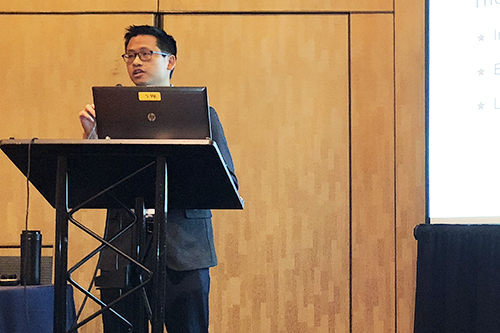 Informatics researchers, professionals and educators from the UAB Informatics Institute had a strong presence at the AMIA 2018 Annual Symposium, held Nov. 3-7 in San Francisco. The symposium is the premier academic conference in biomedical informatics and is sponsored by the American Medical Informatics Association (AMIA). Over 2,200 people attended this year’s conference.
Informatics researchers, professionals and educators from the UAB Informatics Institute had a strong presence at the AMIA 2018 Annual Symposium, held Nov. 3-7 in San Francisco. The symposium is the premier academic conference in biomedical informatics and is sponsored by the American Medical Informatics Association (AMIA). Over 2,200 people attended this year’s conference.
Daniel Heisler, manager of Enterprise Data Warehouse, presented two solutions: “Identifying and Tracking Unapproved Joint Commission Abbreviations in the EHR Using Tableau” and “Optimizing PQRS Metrics and CMS Incentive Payments Using Dashboards” during the Annual Workshop on Visual Analytics in Healthcare (VAHC) on Saturday, Nov. 3. These solutions make information in patient records clearer and improve the quality of care.
Marisa Wilson, D.N.Sc., M.H.Sc., associate professor of Nursing, presented “Hot Topic: Social Behavioral Determinants of Health Research, Education, Practice, and Policy” to the Nursing Informatics Working Group on Sunday, Nov. 4. Addressing barriers to health can help people who need the most help improve their health.
James Cimino, M.D., director of the Informatics Institute and professor of Medicine, was invited to give a featured presentation, “Year in Review: Putting the Working Groups to Work,” on Monday, Nov. 5. In front of an overflow crowd of over 500 attendees, Cimino summarized key developments in biomedical informatics as described in 106 papers nominated by AMIA’s 20 Working Groups. Highlights included using technology to improve prescribing and address the opioid crisis, using voice recognition and EHR and patient-reported data to improve engagement and quality, using big data methods to analyze clinical notes and medical images, and training the next generation of informatics professionals.
Also on Monday, Sue Feldman, R.N., M.Ed., Ph.D., director of Graduate Programs in Health Informatics and associate professor of Health Services Administration, presented a session called “Closing the Gap Between Education and Employment: Leveraging CAHIIM Health Informatics.” Having standards for informatics training programs that meet industry needs ensures that graduates have the skills they need to address many of the greatest challenges in health care.
Wayne Liang, M.D., M.S., assistant professor of Pediatrics, presented a paper on the “Development of a Technology-Supported, Lay Peer-to-Peer Family Engagement Consultation Service in a Pediatric Hospital” on Tuesday, Nov. 6. Avi Madan-Swain, Ph.D., professor of Pediatrics, was a co-author. Using technology to help connect parents of children with serious illnesses to other parents with similar experiences can ease concerns and fears and provide resources for navigating the system.
That same day, John Osborne, Ph.D., assistant professor of Medicine, presented a paper, “Phenotype Detection Registry System (PheDRS) – Implementation of a Generalizable Single Institution Clinical Registry Architecture.” This paper describes development of infrastructure databases of patients with certain diseases that helps researchers find the right patients for clinical trials. James Wells, M.D., associate professor in the Division of Pulmonary, Allergy and Critical Care Medicine; Geoff Gordon, Informatics Institute chief technology officer; Matt Wyatt, director of Clinical Research Informatics; Adarsh Khare, informatics analyst; Donald Dempsey, programmer and analyst; Liang; and Cimino were co-authors.
Cimino also described terminology regarding the process of making medical decisions in a paper presentation, “An Exploration of the Terminology of Clinical Cognition and Reasoning,” on Wednesday, Nov. 7. Organizing and categorizing the many types of information and thought processes that go medical decisions is an important step toward the development of solutions that help health professionals make better decisions.